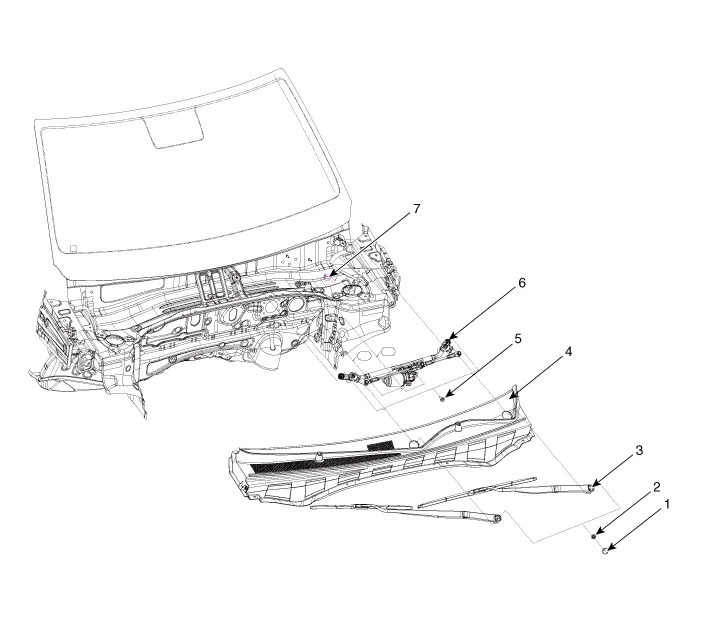Hyundai Palisade (LX2): Windshield Wiper/Washer / Front Wiper Motor
Components and components location
| Component Location |

| 1. Cap 2. Nut 3. Wiper arm & blade 4. Cowl top cover |
5. Bolt 6. Wiper motor & linkage assembly 7. Wiper motor connector |
Repair procedures
| Removal |
| 1. |
Disconnect the negative (-) battery terminal.
|
| 2. |
If necessary, release the wiper blade fixing clip(A) by pulling up and
remove the wiper blade(B) from the inside radius of wiper arm.
|
| 3. |
Remove the cowl top cover.
(Refer to Body - "Cowl Top Cover")
|
| 4. |
Disconnect the wiper motor connector (A) from the wiper motor & linkage
assembly.
|
| 5. |
Remove the windshield wiper motor and linkage assembly (A) after removing
2 bolts.
|
| 6. |
Hold the wiper motor crank arm and remove the upper linkage (A) from
the wiper motor crank arm.
|
| 7. |
Remove the lower linkage (A) from the wiper motor crank arm.
|
| 8. |
Remove the crank arm after loosening a nut.
|
| 9. |
Remove the bracket after loosening the screws.
|
| 10. |
Remove the wiper motor from the tube.
|
| Installation |
| 1. |
Install the wiper motor and linkage assembly and then connect the wiper
motor connector.
|
| 2. |
Install the cowl top cover.
|
| 3. |
Install the windshield wiper arm and blade.
|
| 4. |
Install the wiper arm and blade to the specified position.
A : Auto stop position (Blade)
|
| Inspection |
| 1. |
Remove the connector (A) from the wiper motor.
|
| 2. |
Attach the positive (+) lead from the battery to terminal 3 and the
negative (-) lead to terminal 1.
|
| 3. |
Check that the motor operates at low or high speed as below table.
|
| 1. |
In the body electrical system, failure can be quickly diagnosed by using
the vehicle diagnostic system (Diagnostic tool).
The diagnostic system (Diagnostic tool) provides the following information.
|
| 2. |
If diagnose the vehicle by Diagnostic tool, select "DTC Analysis" and
"Vehicle".
|
| 3. |
Select the 'Data Analysis'.
|
| 4. |
Select the 'IBU_BCM' to search the current state of the input/output
data.
|
Repair procedures Removal 1. Disconnect the negative (-) battery terminal. 2. Remove the steering wheel.
Repair procedures Inspection Front and Rear Washer Motor 1. With the washer motor connected to the reservoir tank, fill the reservoir tank with water.
Other information:
Hyundai Palisade (LX2) 2020-2026 Service Manual: Immobilizer Control Unit
Repair procedures Removal 1. Disconnect the negative (-) battery terminal. 2. Remove the glove box housing. (Refer to Body - "Glove Box Housing Cover") 3.
Hyundai Palisade (LX2) 2020-2026 Service Manual: Repair procedures
Inspection 1. Turn the ignition switch ON. 2. Manually operate the control switch and measure the voltage of the blower motor. 3. Select the control switch to raise the voltage until it reaches high speed.
Categories
- Manuals Home
- Hyundai Palisade Owners Manual
- Hyundai Palisade Service Manual
- Body (Interior and Exterior)
- Resetting the Driver's Seat Memory System
- Electronic Child Safety Lock System
- New on site
- Most important about car


















